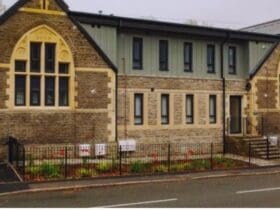The students are fronting a free six-month creative writing course launched by Swansea Council’s Fusion Project, Swansea University and the Dylan Thomas Centre.
Writers of any ability – from newcomers to lifelong enthusiasts – are welcome to attend the classes that are held once a month.
Robert Francis-Davies, the council’s cabinet member for investment, regeneration and tourism, said: “We hope attendees will learn skills that can support them with their ongoing creative journey.
“The aim is to support creativity and build confidence. We’re investing in a full cultural programme for Swansea and this is a great introduction for our residents.
“It’s great that the students are sharing their expertise and supporting others to get creative.
“We hope as many people as possible consider coming along – the sessions are fun and full of bright ideas.”
The Creative Writing Group is open to over 18s, for people from all backgrounds and ages. It was launched a year ago after a gap in such provision was identified through the Fusion project, a joint Swansea Council and Welsh Government-funded initiative aimed at demonstrating how culture builds long-term benefits for people who otherwise might not have the opportunity to take part in cultural activities.
It’s delivered by the council’s cultural services team with the support of organisations and practitioners across the city.
The workshop sessions proved popular last year and have relaunched for the first half of 2020. The next sessions – the same at each venue – will be on Wednesday, February 26, at the Taliesin from 5.30-7.30pm, and on Friday, February 28, in the Dylan Thomas Centre from 10am-noon.
Attendees learn a wide range of skills and techniques, exploring poetry, fiction, screenplays and how to get published.
This year’s theme is sanctuary, inspired by Swansea’s tenth year as a city of sanctuary and Wales’ aspirations to become a nation of sanctuary.
The university’s creative writing department is working with the council through the Fusion project to build on the success of last year. Participants in these free, informal classes, supported by PhD students, may even see their work in a published anthology at the end.
One learner said: “The group was great for me because I feel socially isolated, have illness challenges and hadn’t found many non-physical group activities that suited me before this.
“The great bonus with this group is that it’s free so it’s accessible to all.”








Leave a Reply
View Comments